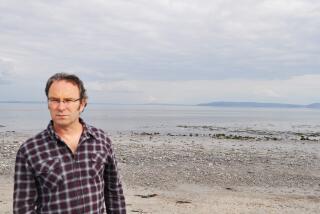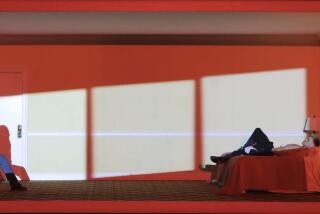The Last Waltz<i> by Ethan Mordden (St. Martin’s: $13.95; 208 pp.) </i>
- Share via
First there was Dublin Johnny Keogh of Bri Leith, which is in the part of Ireland that once was the Kingdom of Tara, or so they say.
Dublin Johnny sails to New York, and then there is Nora, the one who finally traps him, though he’s never skinned. In time, there are Johnny Keogh Jr., Mike Keogh and Dennis Keogh--only one of them is not well and truly a Keogh.
“The King of Tara had three sons,” writes Ethan Mordden in an epilogue: “A warrior, a mason and a poet. The warrior died in battle. The poet told lies. But the mason made the world.”
And, in the prologue: “Each family bears three secrets. . . . One secret conceals something wanted, one secret something known and one secret something done.”
This, then, is a “tale with conversations, a novel without many explanations,” about three sons, about three family secrets.
The first secret is revealed at once, but only to the reader. (The others unfold in due course, like the conversation in a West Country pub.) There is a wake for Nora Keogh, “for she had died suddenly, thrown down a stairwell, the whole five floors.” Suicide, it is ruled, but “there were notions here and about. The Irish live on notions, for there have been times when they had scarcely anything else to live on.”
But first there was Dublin Johnny, strong, braw, brash, quick with the fists. Merciless, really, but with a charm about him, and one of those Irish smiles that renders a woman horizontal in a twinkling.
The King of Tara, is Dublin Johnny, though in New York, the kingdom is shrunk to the neighborhood, the family. A dynasty, however diminished, is still a dynasty.
This is the story, finally and properly, of the three boys, updated avatars of the Princes of Tara: Johnny, the “warrior,” ravaged by his mother’s indifference, devoid of his “da’s” charm, becomes a petty thug.
Mike, the “mason,” steady and assured, becomes an ironworker, one of those Irishmen who built New York, literally, and still do. Mike, Nora’s apple, dreams too, conventionally, straightforwardly, attainably.
Dennis, the baby, the “poet,” becomes unreasonably, tragically successful as a writer of pop songs and a regular on the bicoastal A-lists.
Author Mordden dreams too, aloud and in the poetical prose of the Celts: now a lullaby, more often a roar; now a lilt, now a bawdy limerick, now a dirge. Always edges of tender just under the surface bluster.
He is equally at home in the hamlets of Tara, the perch of the high-rise ironworker, the empty jargon of the meretriciously celebrated. Or, if he is not at home, he fakes it wonderfully, which is the mark of both the Irish and the tale-teller’s craft.
Which is redundant.
More to Read
Sign up for our Book Club newsletter
Get the latest news, events and more from the Los Angeles Times Book Club, and help us get L.A. reading and talking.
You may occasionally receive promotional content from the Los Angeles Times.








